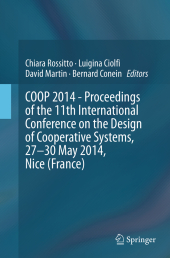 Neuerscheinungen 2016Stand: 2020-02-01 |
Schnellsuche
ISBN/Stichwort/Autor
|
Herderstraße 10
10625 Berlin
Tel.: 030 315 714 16
Fax 030 315 714 14
info@buchspektrum.de |

Luigina Ciolfi, Bernard Conein, David Martin, Chiara Rossitto
(Beteiligte)
COOP 2014 - Proceedings of the 11th International Conference on the Design of Cooperative Systems, 27-30 May 2014, Nice
Herausgegeben von Rossitto, Chiara; Ciolfi, Luigina; Martin, David; Conein, Bernard
Softcover reprint of the original 1st ed. 2014. 2016. xvi, 444 S. 65 SW-Abb., 25 Tabellen. 235 mm
Verlag/Jahr: SPRINGER, BERLIN; SPRINGER INTERNATIONAL PUBLISHING 2016
ISBN: 3-319-38177-6 (3319381776)
Neue ISBN: 978-3-319-38177-0 (9783319381770)
Preis und Lieferzeit: Bitte klicken
This volume presents the proceedings of the 11th International Conference on the Design of Cooperative Systems (COOP 2014). The conference is a venue for multidisciplinary research contributing to the design, assessment and analysis of cooperative systems and their integration in organizations, public venues, and everyday life. COOP emerged from the European tradition of Computer Supported Cooperative Work (CSCW) and Cognitive Ergonomics as practiced in France.
These proceedings are a collection of 28 papers reflecting the variety of research activities in the field, as well as an increasing interest in investigating the use and design of ICT in all aspects of everyday life and society, and not merely in the workplace. The papers represent a variety of research topics, from healthcare to sustainable mobility to disaster response, in settings from all over the world. For the first time, the proceedings include papers presented in an Early-Career Researchers Track which was organized in order to give young researchers the opportunity to discuss their work with an international community.
This collection of papers provides a picture of new developments and classic topics of research around cooperative systems, based on the principle that a deep knowledge of cooperative practices is a key to understanding technology impacts and producing quality designs. The articles presented will appeal to researchers and practitioners alike, as they combine an understanding of the nature of work with the possibilities offered by novel digital technologies.
People, Plans and Place: understanding and supporting responses to rural public transport disruption.- Visualizing Targeted Audiences.- Revising the Role of Plans and Planning in the Management of the Unexpected.- Supporting Team Coordination on the Ground: Requirements from a Mixed-Reality Game.- Nothing Free about Free Market.- Creating Relation Work: Characteristics for Local and Global Collaboration.- Of Corals and Web Portals: Towards a Digital Representation of Risk for the Cold-water Corals in the Oil and Gas Sector.- Unearthing the Information Infrastructure supporting Interpretative Work in Oil and Gas Exploration.- Between Initial Familiarity and Future Use-a Case of Collocated Collaborative Writing.- Suffering Beyond Negotiation: Processes, Cooperation and Participation in Design for Therapy.- "Through the Glossy Box": Supporting ICT Appropriation in Communities of End-users and Designers.- Bug Reproduction: A Collaborative Practice within Software Maintenance Activities.- Collaborative Work and Its Relationship to Technologically-mediated Nomadicity.- Orality, Gender & Social Audio in Rural Africa.- Observing the Work Practices of an Inter-professional Home Care Team or How to Support a Dynamic Approach for Quality Home Care Delivery.- Ethnography in Parallel.- Lessons Learnt Working with Performance Data in Call Centres.- User and Group Behavior in Computer Support for Collaborative Reflection in Practice: An Explorative Data Analysis.- From Crowdsourced Mapping to Community Mapping: The Post-Earthquake Work of Open Street Map Haiti.- Memory Support Functionality in a Collaborative Space - Experiences from the Industry.- Designing Cooperation for Sustainable Mobility - Mobile Methods in Ridesharing Contexts.- Designing for Continuity: Assisting Emergency Planning Practice through Computer-Supported Collaborative Technologies.- Combining collaborative Modeling with collaborative Creativity for Process Design.


